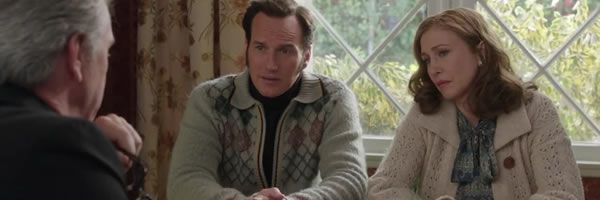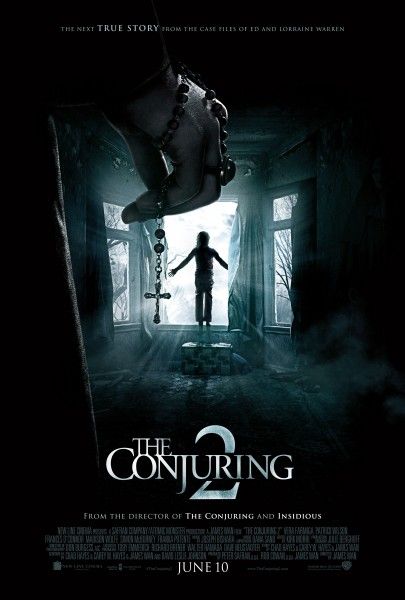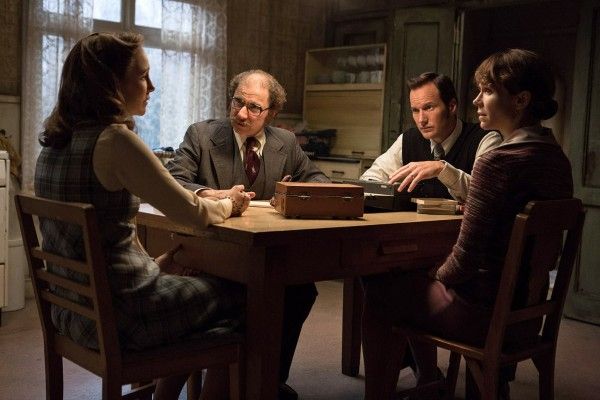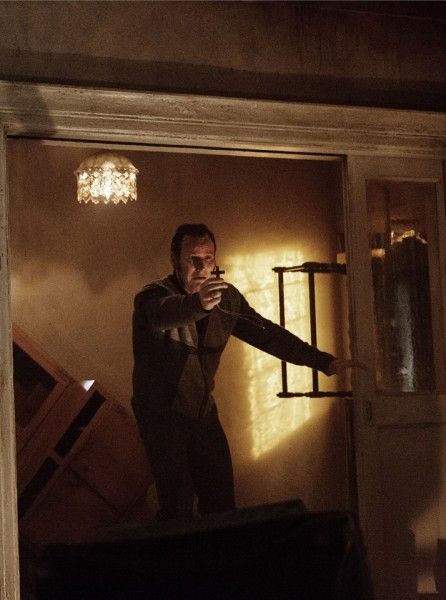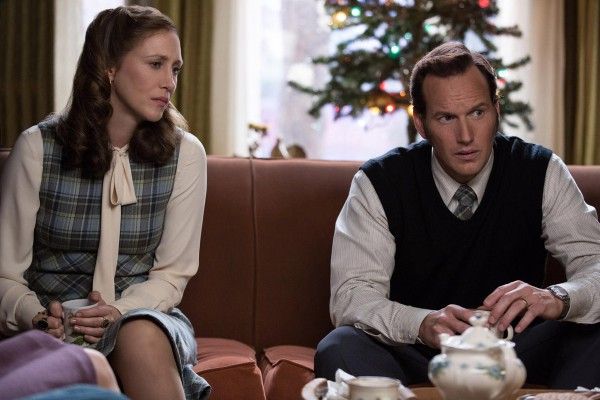Following up the record-breaking success of the first film, the supernatural thriller The Conjuring 2 explores another real case from the files of renowned demonologists Ed (Patrick Wilson) and Lorraine Warren (Vera Farmiga). This time around, the loving couple travels to Enfield in north London to help a single mother raising four children alone in a house plagued by malicious spirits and to determine whether what’s going on is all a hoax.
During the film’s press day, co-stars Vera Farmiga and Patrick Wilson spoke at a roundtable interview about what become the most-documented case in paranormal history, why this storytelling structure was perfect for a franchise, reuniting with director James Wan, the responsibility of playing real people, especially when you’re friends with your subject, that it’s not their job to believe or disbelieve, just how physical this shoot was, and that they’d like a warmer weather climate if they return for The Conjuring 3. Farmiga also talked about how she has no idea what they have in store for the next season of Bates Motel, but that she knows it will be fun.
Question: When you did The Conjuring, did you ever think there would be a sequel?
PATRICK WILSON: I did. I felt like, if we got it right, there would be a sequel. Structurally, I felt like this was a different beast. You’re not following the same people. Within the genre of horror, whenever there have been franchises, it’s all been from the villains point of view, like with Halloween, Friday the 13th, Nightmare on Elm Street and Saw. There hasn’t been a franchise from the positive side and the good side. That’s brings an inherent, “Oh, that’s interesting.” We can dig into their relationship and spend half the movie on that, and then spend the other half on the family. Structurally, from a filmmaker point of view, it’s tee-ed up for you. You just don’t want to screw it up. I figured we’d come back for another one, if we got it right, but we didn’t know if James [Wan] would come back. When he did, we were so thrilled.
What do you think about franchises? Had you wanted to be a part of one?
VERA FARMIGA: A franchise, for me, is the chance to explore deeper characterization and, potentially, a slightly bigger paycheck, which is very alluring. I started off in television and continue to dabble in television, and I love deeper and deeper exploration of a characterization. In this day and age, that’s why television has become so popular. In this age of disconnection, we want to connect, in terms of storytelling, and root for them. That’s why the most popular films are the ones that have sequel. It’s television for the big screen. So, yeah, I was hoping to do a sequel because I absolutely adore this character. I just want to surround myself with fun-loving, kind people, and that’s what this project is. I’d gladly come back, again and again.
Why do you guys think you work so well together?
WILSON: Oh, I don’t know. That’s something that’s just hard to explain. For me, I’ve just reached a point in my life and my career where it is really great to work with somebody that you think the world of, as a person, and then as an actor, you feel like there’s nobody better. And we love playing these people. It’s the right amount of drama and laughter. And you know that, when you come back, nobody is settling for anything. You just mine the film. We’ve got a director (James Wan) and producers that love to push us, and we push them. On the first film, after we met Lorraine and went to her house, we saw these paintings that Ed had done and were like, “We’ve gotta throw those in there.” Of course, now in this one, James had Ed paint.
FARMIGA: The bottom line is that we’re delighted by these characters. We didn’t get the opportunity to meet Ed, but we see their chemistry through Lorraine and the way she speaks about him. It’s really beautiful and really intense and ordained. Their partnership was really holy, in that sense. She’s such a cheerful creature. There are cheerful people, and then there’s Lorraine Warren. She’s so joyful, and it’s bemusing. That affects our performances. We knew they had an incredible love and partnership. So, we had no choice but to try to recreate that.
Do you feel more of a responsibility when you’re playing real people? Does that change how you approach your performance, in any way?
FARMIGA: Particularly when you’re friends with who you’re portraying, yes, absolutely. But at the same time, we’re doing a sweetened, condensed version. This haunting actually went on for years. It was the longest recorded case, historically.
How do you think the setting of the ‘70s affects this?
WILSON: It’s nice to be in a genre movie that takes place in the ‘70s. When I think of the great horror movies, to me, it’s either the ‘70s or the very early ‘80s, from The Shining to Poltergeist with The Exorcist in the middle. Technology wise, there is an innocence with it because you know there’s not the capability of recording things. For the genre, it works well. This is not the time that they can edit it on a computer and go, “Look what I saw!” You either saw it or you didn’t. So, that is a refreshing way to get into it. It would be nice to get to the ‘80s, if for no other reason than to cut my sideburns and to see what hair Vera would have.
Vera, at this point in her life, where is Lorraine Warren at, mentally?
FARMIGA: It’s six years later, and it’s been six more years of skepticism and weariness. Lorraine is quite haggard and tired. It’s post-Amityville, and it’s taken a toll on her. Lorraine is experiencing a certain amount of unwillingness to investigate. I think she’s just tired. Lorraine Warren is very black and white. She knows she has the power. For her, her faith is everything. It is just the toll it takes on her psyche, her mind, her body and her emotions. It’s very emotional. She also feels the potential doom because of the vision she saw in Amityville, regarding Ed. The thought of losing him is what terrifies her the most.
Patrick, why do you think Ed Warren just accepted these things going on and didn’t seem to question the people who claimed to be haunted or possessed?
WILSON: As much of a light that Lorraine is, and the clairvoyance and ethereal nature that she has, Ed was the complete opposite. He was so practical and almost humorous, in the way that he deals with things. There’s no sense of what you think might happen in a horror movie.
FARMIGA: He would joke with poltergeists. You can listen to the recordings. He would instigate these ghosts with humor.
WILSON: He was just completely direct, to a fault, and very forceful, and I love that. That was their balance.
FARMIGA: It’s a very delicate balance. If we were to actually play that forcefulness that Ed possessed with these demons, and the instigation, provocation and humor, it would be outlandish. I think the audience would have a hard time taking it seriously. We just tried to authenticate it, as much as possible.
Obviously, there’s doubt as to whether any of this really happened. Do you have doubt?
FARMIGA: I’m contracted to represent her and her belief system. What’s most important is to find a way into that for myself. I’ve never had any experience in which a poltergeist was out to destroy me, so I can’t really speak on that.
WILSON: I’m a believer, in that I believe there’s another force out there. The skepticism doesn’t scare me or worry me, it interests me. You’re talking about the other side of the coin. I did not grow up a devout Catholic. As an Episcopalian, we don’t spend a lot of time thinking about the devil or demons. I just don’t think about that a lot. The conversation is whether you find faith in the church. You’re constantly looking for some other force or some other power. For me, when I talk about this case, our first job is not to judge the character. I believe what Ed believes, period. That’s where my belief stops. But no matter what you believe, as far as the paranormal or poltergeists, when you see Janet now and you see the pain that it has caused her in her life, and then you see her and Lorraine together,
This is a very physical film. What was the most physical aspect of the production for each of you?
FARMIGA: I still have a swollen lymph node from the amount of screaming I did. It was the contortion of vocal chords and the stress on our vocal chords, take after take after take, from denouncing demons in that operatic way, for 50 takes in a row because there were so many technical elements.
WILSON: This whole movie pushed all of that. The physicality, whether it was vocal strain from screaming, over and over and over, while there’s a wind machine and rain blowing at you, and you’re hanging upside down, it was full-on. There’s nothing worse to me than an actor who complains, but that’s what I kind of love about the movies. There’s a lot going on, and that’s cool. That’s really exciting.
Is there another case that you’d like to explore in The Conjuring 3?
WILSON: Something in a warm weather climate would be nice. The Caribbean would be nice. Maybe Key West. I don’t know. There are thousands of them.
FARMIGA: They worked all around the world, across denominations, faiths and religions, with shamans and rabbis.
WILSON: It would be cool to get another religion in there.
Vera, especially after how things were left in this season, are you prepared for the next season of Bates Motel?
FARMIGA: I have no idea. They’re scheming right now. I know it will be fun. They know how to write for me. I’m sure it’s going to be a wonderful adventure. It was a great year.
The Conjuring 2 opens in theaters on June 10th.

